Charleston, West Virginia, is the state capital and largest city, with a population of 48,864 as of the 2020 census. Located at the confluence of the Kanawha and Elk Rivers, it was founded in 1788 as Charles Town, named after George Clendenin’s father, and incorporated in 1794, later becoming the capital in 1870. Historically, Charleston played a pivotal role during the Civil War as a Union stronghold in a divided state, and its salt production in the 19th century earned the Kanawha Valley the nickname “Salt Capital of the East.” The city’s economy has since evolved, with chemical manufacturing, like the Union Carbide plant (now Dow), becoming a major industry, alongside government and healthcare. Charleston is also a cultural hub, home to the West Virginia State Capitol, a 1932 architectural gem with a 293-foot gold-leaf dome, and the Clay Center for the Arts and Sciences, reflecting its modern vibrancy. Its historical significance is further marked by events like the 1921 Battle of Blair Mountain, a labor uprising tied to the region’s coal industry, which shaped national labor laws.
3 Activities in Charleston
1. Explore the West Virginia State Capitol Complex and State Museum
Dive into the heart of West Virginia’s governance and history by visiting the West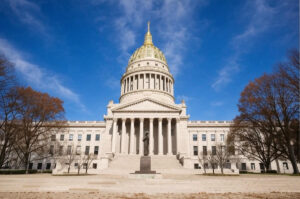 Virginia State Capitol Complex, located at 1900 Kanawha Blvd E, Charleston, WV 25305. The Capitol building, completed in 1932, is a stunning example of neoclassical architecture with its 293-foot gold-leaf dome, which is five feet taller than the U.S. Capitol’s dome. You can take a free guided tour to marvel at the interior, featuring nine types of marble and the iconic chandelier in the rotunda, while learning about the state’s political history. Tours are available daily, but reservations are recommended, especially for groups. Adjacent to the Capitol is the West Virginia State Museum, a must-visit for history buffs. The museum offers a “show path” that takes you from the prehistoric era to the present day, with exhibits like a simulated coal mine, an original settler’s cabin, and displays on the Civil War’s impact on the state’s formation. The museum is free, open Tuesday to Saturday from 9 AM to 5 PM, and Sunday from noon to 5 PM. This activity provides a deep dive into West Virginia’s past and present, perfect for families or anyone interested in history.
Virginia State Capitol Complex, located at 1900 Kanawha Blvd E, Charleston, WV 25305. The Capitol building, completed in 1932, is a stunning example of neoclassical architecture with its 293-foot gold-leaf dome, which is five feet taller than the U.S. Capitol’s dome. You can take a free guided tour to marvel at the interior, featuring nine types of marble and the iconic chandelier in the rotunda, while learning about the state’s political history. Tours are available daily, but reservations are recommended, especially for groups. Adjacent to the Capitol is the West Virginia State Museum, a must-visit for history buffs. The museum offers a “show path” that takes you from the prehistoric era to the present day, with exhibits like a simulated coal mine, an original settler’s cabin, and displays on the Civil War’s impact on the state’s formation. The museum is free, open Tuesday to Saturday from 9 AM to 5 PM, and Sunday from noon to 5 PM. This activity provides a deep dive into West Virginia’s past and present, perfect for families or anyone interested in history.
2. Enjoy Outdoor Recreation at Kanawha State Forest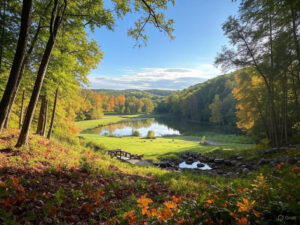 Just seven miles south of downtown Charleston at 7500 Kanawha State Forest Dr, Charleston, WV 25314, Kanawha State Forest spans 9,300 acres of lush wilderness, offering a haven for outdoor enthusiasts. The forest features over 25 miles of trails for hiking, mountain biking, and cross-country skiing, with options ranging from the beginner-friendly Davies Creek Trail to the more challenging Rocky Ridge Trail. It’s a prime spot for birdwatching, with 19 species of wood warblers nesting in the woodlands, and families can enjoy picnic areas and a playground for kids. For those seeking a more rugged experience, the forest has a shooting range and campsites, though some areas lack cell service, adding to the sense of disconnection from urban life. The forest is particularly stunning in the fall, when the foliage transforms into a vibrant display of colors, making it a top spot for autumn visits. It’s open daily from dawn to dusk, and while entry is free, some activities like camping may have small fees. This is an ideal activity for nature lovers or families looking to spend a day immersed in West Virginia’s natural beauty.
Just seven miles south of downtown Charleston at 7500 Kanawha State Forest Dr, Charleston, WV 25314, Kanawha State Forest spans 9,300 acres of lush wilderness, offering a haven for outdoor enthusiasts. The forest features over 25 miles of trails for hiking, mountain biking, and cross-country skiing, with options ranging from the beginner-friendly Davies Creek Trail to the more challenging Rocky Ridge Trail. It’s a prime spot for birdwatching, with 19 species of wood warblers nesting in the woodlands, and families can enjoy picnic areas and a playground for kids. For those seeking a more rugged experience, the forest has a shooting range and campsites, though some areas lack cell service, adding to the sense of disconnection from urban life. The forest is particularly stunning in the fall, when the foliage transforms into a vibrant display of colors, making it a top spot for autumn visits. It’s open daily from dawn to dusk, and while entry is free, some activities like camping may have small fees. This is an ideal activity for nature lovers or families looking to spend a day immersed in West Virginia’s natural beauty.
3. Experience Live Music and Events at Haddad Riverfront Park
Located along the Kanawha River at Kanawha Blvd E, Charleston, WV 25301,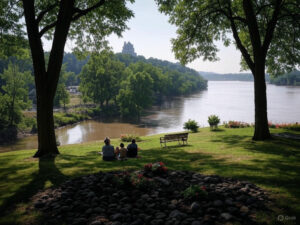 Haddad Riverfront Park is a scenic spot to enjoy live music and community events while taking in views of the river and downtown skyline. The park features a 2,500-seat amphitheater that hosts the popular “Live on the Levee,” a free concert series held every Friday from May through September, showcasing a variety of music genres like rock, jazz, and blues. Beyond music, the park is perfect for a leisurely walk along the riverfront trail, a picnic with family, or watching boats dock along the river. It’s also a great spot for boaters to anchor and enjoy events from the water. The park occasionally hosts festivals, such as food truck events or cultural celebrations, adding to its lively atmosphere. It’s open daily, and events like Live on the Levee typically run from 6:30 PM to 9:00 PM, with schedules varying by season. This activity offers a mix of relaxation and entertainment, making it a great choice for couples, families, or anyone looking to soak in Charleston’s community spirit.
Haddad Riverfront Park is a scenic spot to enjoy live music and community events while taking in views of the river and downtown skyline. The park features a 2,500-seat amphitheater that hosts the popular “Live on the Levee,” a free concert series held every Friday from May through September, showcasing a variety of music genres like rock, jazz, and blues. Beyond music, the park is perfect for a leisurely walk along the riverfront trail, a picnic with family, or watching boats dock along the river. It’s also a great spot for boaters to anchor and enjoy events from the water. The park occasionally hosts festivals, such as food truck events or cultural celebrations, adding to its lively atmosphere. It’s open daily, and events like Live on the Levee typically run from 6:30 PM to 9:00 PM, with schedules varying by season. This activity offers a mix of relaxation and entertainment, making it a great choice for couples, families, or anyone looking to soak in Charleston’s community spirit.
Places to Eat in Charleston
1. 1010 Bridge Restaurant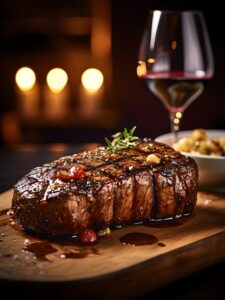 Located at 1010 Bridge Road in the South Hills neighborhood, 1010 Bridge Restaurant is a standout for fine dining in Charleston, often praised for its sophisticated yet approachable American cuisine. Chef Paul Smith, a 2024 James Beard Award winner for Best Chef in the Southeast, elevates regional classics with elegant twists, earning the restaurant a reputation as a go-to for foodies. The ambiance is upscale yet warm, making it ideal for special occasions or a refined night out. The menu features dishes like the Filet Mignon, known for its tenderness and rich flavor, and the Dijon & Dill Crusted Chilean Salmon, a favorite for its balanced seasoning. Starters such as the White Cheddar Pimento Cheese appetizer are a crowd-pleaser, offering a creamy, tangy bite that pairs well with their creative cocktails. Reviewers consistently highlight the outstanding service, with staff often described as knowledgeable and attentive, sometimes offering sightseeing tips alongside their recommendations. The restaurant also caters to a variety of tastes with its versatile menu, which changes to incorporate fresh, local ingredients. For more details or to make a reservation, you can visit their website at 1010bridge.com.
Located at 1010 Bridge Road in the South Hills neighborhood, 1010 Bridge Restaurant is a standout for fine dining in Charleston, often praised for its sophisticated yet approachable American cuisine. Chef Paul Smith, a 2024 James Beard Award winner for Best Chef in the Southeast, elevates regional classics with elegant twists, earning the restaurant a reputation as a go-to for foodies. The ambiance is upscale yet warm, making it ideal for special occasions or a refined night out. The menu features dishes like the Filet Mignon, known for its tenderness and rich flavor, and the Dijon & Dill Crusted Chilean Salmon, a favorite for its balanced seasoning. Starters such as the White Cheddar Pimento Cheese appetizer are a crowd-pleaser, offering a creamy, tangy bite that pairs well with their creative cocktails. Reviewers consistently highlight the outstanding service, with staff often described as knowledgeable and attentive, sometimes offering sightseeing tips alongside their recommendations. The restaurant also caters to a variety of tastes with its versatile menu, which changes to incorporate fresh, local ingredients. For more details or to make a reservation, you can visit their website at 1010bridge.com.
2. Dem 2 Brothers and a Grill
Situated at 426 Virginia St W on Charleston’s Westside, Dem 2 Brothers and a Grill is a beloved spot for authentic Southern BBQ, earning high praise for its mouthwatering, slow-cooked meats. This casual eatery has a laid-back vibe, often bustling with locals and visitors alike, and is celebrated for its fall-off-the-bone ribs, smoked chicken breasts, and signature brisket. The menu focuses on classic BBQ fare, with sides like coleslaw and baked beans that complement the smoky flavors perfectly. Reviewers on platforms like Yelp and Tripadvisor frequently mention the generous portions and the tender, flavorful meats, with one diner noting the pulled pork sandwich for its crispy bits and large serving size. The restaurant also made it into the book 100 Things to Do in West Virginia Before You Die, underscoring its status as a local gem. It’s a great spot for families or anyone craving hearty, comfort food with a Southern twist. While they don’t have a dedicated website, you can find more information through the Charleston Convention & Visitors Bureau at charlestonwv.com.
Grill is a beloved spot for authentic Southern BBQ, earning high praise for its mouthwatering, slow-cooked meats. This casual eatery has a laid-back vibe, often bustling with locals and visitors alike, and is celebrated for its fall-off-the-bone ribs, smoked chicken breasts, and signature brisket. The menu focuses on classic BBQ fare, with sides like coleslaw and baked beans that complement the smoky flavors perfectly. Reviewers on platforms like Yelp and Tripadvisor frequently mention the generous portions and the tender, flavorful meats, with one diner noting the pulled pork sandwich for its crispy bits and large serving size. The restaurant also made it into the book 100 Things to Do in West Virginia Before You Die, underscoring its status as a local gem. It’s a great spot for families or anyone craving hearty, comfort food with a Southern twist. While they don’t have a dedicated website, you can find more information through the Charleston Convention & Visitors Bureau at charlestonwv.com.
3. Pies & Pints Found at 222 Capitol St in the heart of downtown Charleston, Pies & Pints is a trendy yet laid-back restaurant renowned for its creative pizzas and extensive craft beer selection. The atmosphere is lively, especially on weekend evenings, with waits sometimes reaching up to two hours due to its popularity—arriving early or opting for lunch is a smart move. Their menu specializes in artisanal pizzas with unique toppings, such as the Black Bean Pizza with roasted corn and chipotle crema, or the classic pepperoni and sausage, which one reviewer described as the best calzone they’d ever had due to its garlic infusion. Small pies are perfect for kids to share, while large pies can feed a family when paired with appetizers like their signature garlic bread. The beer list is a highlight, offering samples for those unsure of their pick, and the casual setting makes it a favorite for groups or families. Pies & Pints originated in Fayetteville, West Virginia, and this location was its second, cementing its place in the state’s culinary scene. You can check out their menu and more at piesandpints.net.
Found at 222 Capitol St in the heart of downtown Charleston, Pies & Pints is a trendy yet laid-back restaurant renowned for its creative pizzas and extensive craft beer selection. The atmosphere is lively, especially on weekend evenings, with waits sometimes reaching up to two hours due to its popularity—arriving early or opting for lunch is a smart move. Their menu specializes in artisanal pizzas with unique toppings, such as the Black Bean Pizza with roasted corn and chipotle crema, or the classic pepperoni and sausage, which one reviewer described as the best calzone they’d ever had due to its garlic infusion. Small pies are perfect for kids to share, while large pies can feed a family when paired with appetizers like their signature garlic bread. The beer list is a highlight, offering samples for those unsure of their pick, and the casual setting makes it a favorite for groups or families. Pies & Pints originated in Fayetteville, West Virginia, and this location was its second, cementing its place in the state’s culinary scene. You can check out their menu and more at piesandpints.net.
These restaurants showcase Charleston’s diverse food offerings, from fine dining to Southern BBQ and inventive pizzas, ensuring there’s something for every palate in the capital city.
RV Parks
1. Lazy K’s Campground
Located just 12 miles from Charleston at 1093 State St, Elkview, WV 25071, Lazy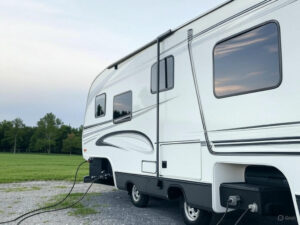 K’s Campground is the closest privately owned campground to the city, making it a convenient base for exploring both urban and outdoor attractions. Nestled along the Elk River and surrounded by over 70 acres of West Virginia’s rolling hills, this family-owned campground prides itself on its motto, “Where Strangers Become Friends.” It’s open year-round, offering a mix of serene natural surroundings and easy access to Interstate-79, with Charleston’s amenities like shopping and dining just a short drive away. The campground is ideal for those seeking a balance of relaxation and adventure, with nearby activities like whitewater rafting, fishing, and ATV trails within 3 miles. Lazy K’s is pet-friendly and caters to a variety of camping styles, ensuring a welcoming experience for all guests. Main amenities include spacious 50-amp full hookup RV sites (water, sewer, and electric), fully furnished cabins, primitive tent sites along the Elk River, a catch-and-release fishing pond, an outdoor pavilion for gatherings, and access to hiking and biking trails on the property. Wi-Fi is not explicitly mentioned, so it’s wise to check directly if needed.
K’s Campground is the closest privately owned campground to the city, making it a convenient base for exploring both urban and outdoor attractions. Nestled along the Elk River and surrounded by over 70 acres of West Virginia’s rolling hills, this family-owned campground prides itself on its motto, “Where Strangers Become Friends.” It’s open year-round, offering a mix of serene natural surroundings and easy access to Interstate-79, with Charleston’s amenities like shopping and dining just a short drive away. The campground is ideal for those seeking a balance of relaxation and adventure, with nearby activities like whitewater rafting, fishing, and ATV trails within 3 miles. Lazy K’s is pet-friendly and caters to a variety of camping styles, ensuring a welcoming experience for all guests. Main amenities include spacious 50-amp full hookup RV sites (water, sewer, and electric), fully furnished cabins, primitive tent sites along the Elk River, a catch-and-release fishing pond, an outdoor pavilion for gatherings, and access to hiking and biking trails on the property. Wi-Fi is not explicitly mentioned, so it’s wise to check directly if needed.
2. Kanawha State Forest Campground Situated just 7 miles south of downtown Charleston at 7500 Kanawha State Forest Dr, Charleston, WV 25314, Kanawha State Forest Campground offers a forested retreat perfect for outdoor enthusiasts. Spanning over 9,300 acres, the campground is part of a historic state forest established in 1937, with its development aided by the Civilian Conservation Corps, which built roads, picnic shelters, and a dam on Davis Creek. The forest is listed on the National Register of Historic Places, adding a layer of historical charm to your stay. It’s a haven for nature lovers, with over 60 miles of hiking and biking trails, including 45 miles open to mountain bikes, and opportunities for in-season hunting with a valid license. The campground itself is year-round, but it’s best suited for smaller rigs due to size restrictions. Main amenities include 46 campsites, with 25 offering water and electric hookups (30-50 amp), 9 with electric only, and 12 primitive sites, each equipped with a fireplace and picnic table. There are two bathhouses (one may close seasonally), coin-operated laundry, a stocked fishing stream with wheelchair-accessible piers, picnic areas, playgrounds, and a free shooting range. Note that RVs or trailers longer than 26 feet are not recommended due to the campground’s layout.
Situated just 7 miles south of downtown Charleston at 7500 Kanawha State Forest Dr, Charleston, WV 25314, Kanawha State Forest Campground offers a forested retreat perfect for outdoor enthusiasts. Spanning over 9,300 acres, the campground is part of a historic state forest established in 1937, with its development aided by the Civilian Conservation Corps, which built roads, picnic shelters, and a dam on Davis Creek. The forest is listed on the National Register of Historic Places, adding a layer of historical charm to your stay. It’s a haven for nature lovers, with over 60 miles of hiking and biking trails, including 45 miles open to mountain bikes, and opportunities for in-season hunting with a valid license. The campground itself is year-round, but it’s best suited for smaller rigs due to size restrictions. Main amenities include 46 campsites, with 25 offering water and electric hookups (30-50 amp), 9 with electric only, and 12 primitive sites, each equipped with a fireplace and picnic table. There are two bathhouses (one may close seasonally), coin-operated laundry, a stocked fishing stream with wheelchair-accessible piers, picnic areas, playgrounds, and a free shooting range. Note that RVs or trailers longer than 26 feet are not recommended due to the campground’s layout.
3. Rippling Waters Church of God Campground
Located near the town of Romance, about 16 miles northeast of Charleston at 1211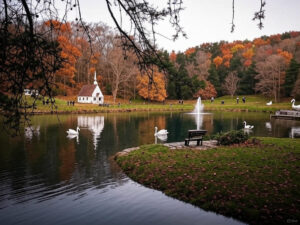 S Co Rd 21/2, Romance, WV 25168, Rippling Waters Church of God Campground is a family-friendly option ideal for those seeking a peaceful retreat with a spiritual touch. This campground is known for its serene setting along the Elk River, offering a mix of natural beauty and community-oriented activities. It’s a great base for families looking to explore Charleston while enjoying a quieter, more secluded camping experience. The campground is praised for its cleanliness and welcoming atmosphere, often hosting church events and gatherings that add to its communal feel. It’s also conveniently located for day trips to Charleston’s attractions, like the West Virginia State Capitol Complex, or outdoor adventures in the surrounding area. Main amenities include full hookup RV sites with water, electric (20/30/50-amp), and sewer, as well as tent sites for those preferring a more rustic experience. Other features include clean restrooms and showers, a communal gathering area for socializing, picnic tables and fire pits at each site, and access to the Elk River for fishing and water activities. Wi-Fi availability isn’t specified, so it’s best to confirm with the campground directly.
S Co Rd 21/2, Romance, WV 25168, Rippling Waters Church of God Campground is a family-friendly option ideal for those seeking a peaceful retreat with a spiritual touch. This campground is known for its serene setting along the Elk River, offering a mix of natural beauty and community-oriented activities. It’s a great base for families looking to explore Charleston while enjoying a quieter, more secluded camping experience. The campground is praised for its cleanliness and welcoming atmosphere, often hosting church events and gatherings that add to its communal feel. It’s also conveniently located for day trips to Charleston’s attractions, like the West Virginia State Capitol Complex, or outdoor adventures in the surrounding area. Main amenities include full hookup RV sites with water, electric (20/30/50-amp), and sewer, as well as tent sites for those preferring a more rustic experience. Other features include clean restrooms and showers, a communal gathering area for socializing, picnic tables and fire pits at each site, and access to the Elk River for fishing and water activities. Wi-Fi availability isn’t specified, so it’s best to confirm with the campground directly.
These RV parks provide a range of experiences, from the nature-focused Kanawha State Forest to the community-driven Lazy K’s and Rippling Waters, ensuring you can find the perfect spot to park your RV while exploring Charleston and its surroundings. Always call ahead to confirm availability and specific amenities, as offerings can change seasonally.
In-Depth Summary of Charleston Century by Stephen H. Provost
 Charleston Century explores the history of Charleston, West Virginia, from the early 20th century to the present day, focusing on its role as the state capital and its cultural, economic, and social transformations. The book is a companion to Provost’s *Huntington Century*, which covers West Virginia’s second-largest city, and together they paint a picture of the state’s two major urban centers, connected by U.S. Highway 60. Provost, a historian and author, emphasizes Charleston’s distinctive beauty, describing the city’s setting along the Kanawha River with its rolling hills and lush greenery as a backdrop that sets it apart from other American cities.
Charleston Century explores the history of Charleston, West Virginia, from the early 20th century to the present day, focusing on its role as the state capital and its cultural, economic, and social transformations. The book is a companion to Provost’s *Huntington Century*, which covers West Virginia’s second-largest city, and together they paint a picture of the state’s two major urban centers, connected by U.S. Highway 60. Provost, a historian and author, emphasizes Charleston’s distinctive beauty, describing the city’s setting along the Kanawha River with its rolling hills and lush greenery as a backdrop that sets it apart from other American cities.
The narrative begins with Charleston’s early industrial roots, particularly its pivotal role in the nation’s petrochemical industry. Provost highlights the establishment of the Union Carbide factory on an island in the Kanawha River, which marked Charleston as a key player in industrial development during the early 20th century. This industry brought economic growth but also environmental challenges, many of which are now part of the city’s past as the smokestacks and storage tanks have largely disappeared. The book delves into how this industrial boom shaped Charleston’s economy and workforce, drawing in workers and fostering a bustling urban center.
Provost also captures Charleston’s historical significance through its landmarks, with a particular focus on the West Virginia State Capitol building. He describes the Capitol’s golden dome, which stands 293 feet tall and is a striking feature visible upon entering the city, especially when the sun reflects off it and the Kanawha River in the foreground. The Capitol, completed in 1932, symbolizes Charleston’s role as the political heart of West Virginia, a status it has held since becoming the permanent capital in 1885 after a back-and-forth with Wheeling. The book likely includes anecdotes about the Capitol’s construction and its architect, Cass Gilbert, who also designed the U.S. Supreme Court building, adding a layer of architectural history to the city’s story.
The book doesn’t shy away from Charleston’s broader historical context, including its origins in the late 18th century when pioneers like George Clendenin established Fort Lee in 1787, naming the settlement after his father, Charles. Provost likely touches on early industries like salt production, which earned the Kanawha Valley the nickname “Salt Capital of the East” in the 19th century, and the discovery of the first natural gas well, which further fueled economic growth. The narrative may also cover significant events like the 1921 Battle of Blair Mountain, a labor uprising in the nearby coalfields that influenced national labor laws, reflecting Charleston’s connection to the region’s coal industry and labor history.
Culturally, *Charleston Century* highlights notable figures from the city, such as country music star Kathy Mattea and basketball legend Jerry West, both of whom were born in Charleston or its surrounding areas. These figures underscore the city’s contributions to American culture and sports, adding a personal dimension to the historical narrative. Provost also weaves in his own experiences, describing his drive from Virginia to Charleston and his awe at the city’s scenic beauty, which gives the book a personal touch alongside its historical analysis.
The book likely addresses Charleston’s evolution into a modern city, with its economy shifting from heavy industry to sectors like government, medicine, and education. Institutions like Charleston Area Medical Center and the University of Charleston are part of this transition, reflecting the city’s adaptation to changing times. Provost’s writing style is engaging, blending historical facts with vivid descriptions of the city’s landscape and landmarks, making *Charleston Century* both an informative and visually evocative read for those interested in West Virginia’s history.
Where to Buy Charleston Century
*Charleston Century* by Stephen H. Provost can be purchased through several outlets, though availability may vary since it was published in 2021. Here are some options:
Local Independent Bookstores in Charleston: Taylor Books, located at 226 Capitol St, Charleston, WV 25301, is the city’s only independent bookstore and a great place to look for local history books. They often carry works about West Virginia and may have *Charleston Century* in stock or can order it for you. Their website (taylorbooks.com) provides contact information for inquiries, and they’re open Monday through Thursday from 7 a.m. to 8 p.m., Friday from 7 a.m. to 10 p.m., Saturday from 9 a.m. to 10 p.m., and Sunday from 9 a.m. to 5 p.m.
West Virginia Book Company: This Charleston-based publisher and bookseller, located at 1125 Central Avenue, Charleston, WV 25302, specializes in stories about the Mountain State. They may carry *Charleston Century* or be able to source it. You can visit their website (wvbookco.com) to check availability or contact them directly.
Kanawha County Public Library: While not a purchase option, the library at 123 Capitol St, Charleston, WV 25301, might have a copy available for borrowing, especially given their involvement with the West Virginia Book Festival. Their website (kcpls.org) allows you to search their catalog, and they often stock local history books.
Since Charleston Century is a niche historical book, availability might depend on stock, so calling ahead to confirm is recommended. If purchasing online, check shipping times, as they can vary depending on your location and the seller’s distribution. Supporting local bookstores like Taylor Books also helps sustain Charleston’s cultural scene, which aligns with the book’s focus on the city’s heritage.
Final Thoughts for The Smart RVer
Charleston, the capital and largest city of West Virginia, sits at the confluence of the Elk and Kanawha rivers in Kanawha County, nestled in the Allegheny Mountains. With a population of around 46,838 as of 2023, it has a rich history dating back to its founding in 1794, initially thriving on salt production before coal, gas, and chemical industries took over. The city became the permanent state capital in 1885, featuring a stunning State Capitol with a gold-leafed dome. Charleston offers a blend of small-town charm and urban amenities, with attractions like the Clay Center for the Arts & Sciences, Kanawha State Forest, and a vibrant culinary scene, all while serving as a hub for outdoor recreation and Appalachian culture.
